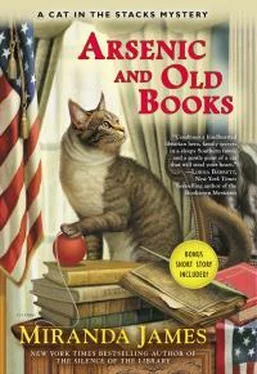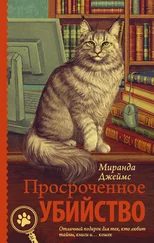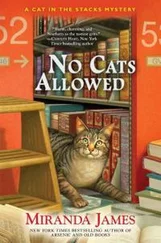“He’s a smart cat,” I said. “He’s also extremely curious.” As I spoke Diesel batted a paw at the tote bag. “No, Diesel, stop that.”
The cat threw a baleful glance my way. He stood, made a circle around Mrs. Long’s chair, and then came back to his perch on the windowsill behind my desk.
“Apparently he understands a firm no when he hears one.” Mrs. Long laughed. “Our dogs aren’t always so compliant.”
“He isn’t, either,” I had to admit. “Depends on his mood.” I waited a moment for the mayor to speak again. When she didn’t, I decided it was time to steer the conversation toward the reason for her visit. “I believe you wanted to consult me about some family documents.”
Mrs. Long picked up the tote and settled it in her lap. She delved inside and pulled out a large manila envelope. She leaned forward and placed it on my desk. A faint mustiness, overlaid with a whiff of mothballs, wafted out of the open end.
“Inside that you will find a volume of a diary written by Rachel Afton Long. I forget at the moment how many times a great-grandmother she is, but she was born around 1820 and died in the mid-1890s, if I am remembering correctly.”
I stared at the envelope before me, my excitement growing over the thought of handling such an old document. “How many volumes of her diaries survive?” I pulled open a side drawer of my desk and extracted a pair of cotton gloves. If I was going to be handling a book that was more than a hundred years old, I had to be careful with it.
“Four,” Mrs. Long replied. “I have glanced at them but I find the writing hard to read. From what I could glean, however, I believe she started the diaries a few years before she married my husband’s ancestor. The last diary is dated around 1875.” She shrugged. “I’m not entirely certain. The handwriting is small and cramped, and I got a headache trying to decipher just one page of it.”
“I’ll have a look at it,” I said. I held up my hands to show that I was wearing gloves before I extracted the volume, sliding it carefully out of the envelope. I let it lie on the desk as I put the envelope aside and examined the diary’s outward appearance. The cover binding of brown leather was cracked in spots and rubbed thin in others, and the spine was in similar condition. My nose twitched at the strong musty odor. I hoped the diaries hadn’t suffered water damage.
“Where have they been stored?” I asked.
“My son, Beck, discovered them recently in a trunk in the attic while hunting for something else entirely. I’d never seen them before, and I don’t believe my husband was aware of their existence, either.”
Andrew Beckwith Long, known as Beck to most, was an aspiring politician. His father, also an Andrew, had served four terms in the state senate. Recently, however, he had announced he planned to retire when his current term expired. Everyone assumed that Beck would easily win his father’s seat but there appeared to be strong opposition, in the form of Jasper Singletary, a young firebrand who served on the city council. Singletary was openly ambitious, and he had been publicly less than complimentary about the Longs and their political legacy.
“Are you and Mr. Long planning to add these to the collection of Long papers and memorabilia that we already have?”
“Yes,” Mrs. Long said. “They need to be better preserved than they have been. We have no idea how long they’ve been up in that attic, and there could be damage. None of us looked through them much because we were afraid to cause further problems. That’s why I wanted to bring them to you.” She paused. “I’m sure you’re aware of the terrible times that Athena faced during the Civil War and the brief occupation by Union troops. If Rachel Long recorded any of that, her information might be useful to historians.”
I nodded. My knowledge of Athena during the Civil War was sketchy, but in elementary school we had heard tales of the depredations of the Union Army in the winter of 1863. Our teacher, Mrs. Bondurant, had seemed so old to us at the time, we figured she was speaking from personal experience. I discovered later, when I was older and possessed a better sense of a person’s age, that Mrs. Bondurant was only thirty-eight and her grandmother, a Confederate widow, was the source of her stories.
“I’m sure there will be graduate students in the history department eager to examine them,” I said. “The Southern-history students are always looking for local primary sources for their theses and dissertations.”
“Excellent,” Mrs. Long said. “My husband and son will be delighted to hear it. They’re both avid readers of history, particularly of Southern history.”
“Do you have a few minutes, while I make a quick examination of the volumes?” I asked. “I can give you a rough idea whether we will need to do any conservation work with them.”
Mrs. Long consulted her watch. “I have about ten minutes before I need to be back in my office.”
“Good.” I opened the cover of the volume on my desk with a gentle touch. The inch-thick binding was loose enough that the cover lay open on the desk without strain. I wrinkled my nose at the smell again, but I knew I would soon become accustomed to it. The more the volumes were allowed to air out, the more the odor would dissipate.
The first page of the diary had only a few words in a small, but elegant, hand. I recognized the slightly tilted lettering as copperplate, a style of handwriting popular in the nineteenth century. The words proclaimed this as the diary of Rachel Adeline Afton, aged sixteen, with the date July 4, 1854. The paper was yellowed but still in good condition. I suspected that it was the more expensive rag paper rather than the cheaper wood pulp. The latter would have turned brown and brittle years ago and begun to disintegrate.
I turned pages carefully and skimmed the contents as I went. There were no blemishes I could see, no water stains, mold, or mildew. Overall, the diary appeared to be in remarkably good condition, other than the state of the binding and the worn cover. “If the other volumes are in similar condition,” I said, “then everything should be fine. Conservation work will be minimal, though we will store them in archival folders. The paper is acid-free and won’t affect the contents.”
“That sounds fine.” Mrs. Long smiled briefly. “We are placing no restrictions on these diaries, Mr. Harris. We want scholars to be able to use the contents for their work.” She stood and passed the tote with the other volumes to me.
I took the bag and pulled out the three remaining manila envelopes, each with a diary inside. “That’s excellent news. As soon as I’ve had the time to check each one more thoroughly, I’ll let the history department know about them.”
“They are already aware of the gift,” Mrs. Long said. “One of my husband’s good friends—and mine as well—is Professor Howell Newkirk. He was dining with us last night, and I happened to mention it to him.”
“I see.” That was unexpected news. I was acquainted with Dr. Newkirk. He was elderly, irascible, and pushy. He was also the most eminent historian on the Athena faculty, and he knew it. He demanded, and was usually given, what he wanted. I was surprised he wasn’t already in my office asking to see the diaries.
Mrs. Long smiled. “I know Howell can be, well, rather insistent on things, but I suggested that he give you a few days with the diaries before he even thought about assigning a student to work on them. There might be others interested in them as well.”
“Thank you,” I said. “Then I will make sure they are ready sooner rather than later. I will add these to the list attached to your original deed of gift for the rest of the collection, if that’s okay with you.”
Читать дальше












